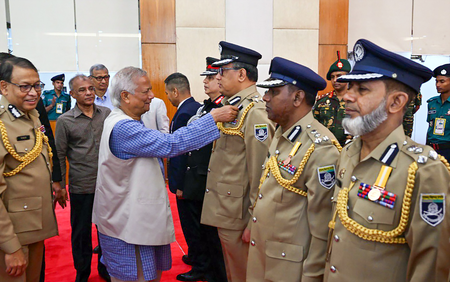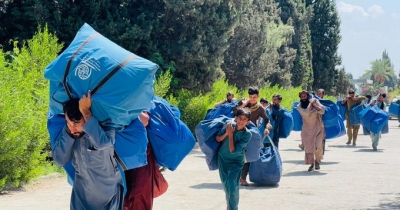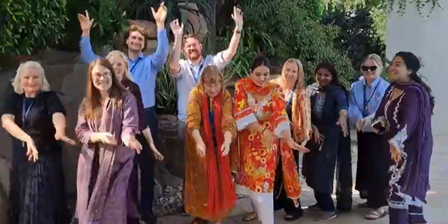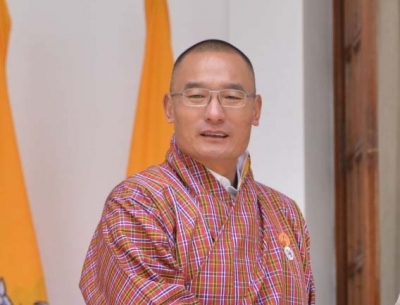
Dhaka, Aug 27 (IANS) Since the fall of the Awami League government in Bangladesh last year, the country’s Hindu minority has faced a surge in violence, land grabs, temple desecrations, and forced resignations. Islamist groups like Hefazat-e-Islam and Hizb ut-Tahrir have grown bolder, pushing for Islamic statehood, a report has highlighted.
“The situation has become worse with several Islamist groups gaining ground with state patronage. For instance, Hefazat-e-Islam Bangladesh (HIB) has become increasingly active across the country, reiterating its 2013 issued 13-point charter of demands, which, among other things, calls for a ban on public sculptures, mixed-gender spaces, and the declaration of Ahmadis as non-Muslims. Its leader, Mufti Enayetullah Abbasi, whom many call ‘Helicopter Huzur’ for his lavish use of helicopters for public lecturing across Bangladesh, has threatened armed revolution if demands remain unmet,” Madhurima Pramanik, a Research Scholar at the Academy of International Studies in New Delhi’s Jamia Millia Islamia, wrote in her analysis for the International Centre for Peace Studies (ICPS).
“Not to be left behind, Hizb ut-Tahrir (HuT), which is a transnational Islamist group with the ultimate aim of establishing an Islamic state by capturing state institutions from within, has also mobilised its cadre across the country. The group organised a mass rally under the banner of ‘Conscious Teachers and Students’, demanding that Bangladesh be declared an Islamic State,” the writer elaborates.
The country’s future remains uncertain as concerns over democratic backsliding have not only persisted but grown due to no definite timeline for conducting free and fair elections.
Bangladesh’s charter demands elections within 90 days of parliamentary dissolution. A year has passed since the ouster of the Awami League government led by former Prime Minister Sheikh Hasina and the ballot box remains conspicuously absent. The democratic deficit is not new — but it’s deepening.
“Bangladesh stands at a crossroads, with persisting economic issues, a rising Islamist wave, continued internal security challenges, and shifting international alignments. With growing uncertainty surrounding the upcoming elections, maintaining stability and ensuring effective governance becomes even more critical,” the ICPS article titled ‘From Hasina to Yunus: The Fragile Promises of Bangladesh’s Political Reset’ details.
The uprising that toppled Hasina also came at a steep human cost. Over 800 lives were lost, including more than 100 children. Security forces allegedly fired live rounds at unarmed protesters. Internet blackouts followed.
The new Cyber Security Ordinance, while rebranded, retains many of the draconian provisions that stifled free expression. Attacks on journalists persist. And beyond the political sphere, a more insidious threat has emerged: the rise of religious intolerance.
“Conducting a fair election is urgently required, and the future governance must prioritise regional diplomacy, economic stability, and institutional reform to prevent further erosion of democratic and humanitarian standards. As such, the future of “Bangladesh 2.0” depends not only on healing past wounds but on ensuring inclusive, equitable governance that upholds fundamental rights and democratic norms,” writes Pramanik.
Chief Advisor Muhammad Yunus’ “reform-first, elections-later” roadmap also remains at odds with constitutional expectations.
Economically too, the country is teetering. The World Bank and IMF have both slashed growth forecasts. The garment industry, once Bangladesh’s pride, is collapsing under the weight of mismanagement and global headwinds. Factory closures and unpaid wages have triggered unrest, with women — who make up the bulk of the workforce — bearing the brunt.
In this volatile mix of political uncertainty, economic fragility, and rising extremism, one thing is clear: Bangladesh stands at a crossroads.
“After a year into what many termed ‘Bangladesh 2.0’, concerns over democratic backsliding have not only persisted but grown due to no definite timeline for conducting free and fair elections,” the ICPS article states.
–IANS
sktr/as




